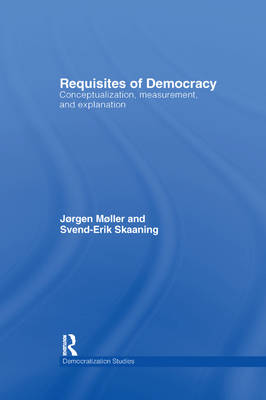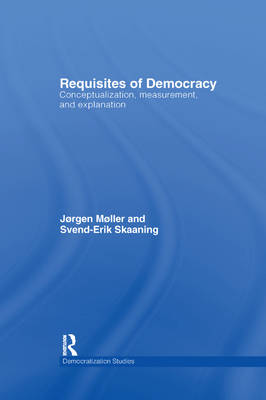
- Afhalen na 1 uur in een winkel met voorraad
- Gratis thuislevering in België vanaf € 30
- Ruim aanbod met 7 miljoen producten
- Afhalen na 1 uur in een winkel met voorraad
- Gratis thuislevering in België vanaf € 30
- Ruim aanbod met 7 miljoen producten
Requisites of Democracy
Conceptualization, Measurement, and Explanation
Jørgen Møller, Svend-Erik SkaaningOmschrijving
This book brings together the conceptual and theoretical writings of Joseph Schumpeter, Robert A. Dahl, Guillermo O'Donnell, and T. H. Marshall. It demonstrates that most of the different conceptions of democracy in the democratization literature can be ordered in one systematic regime typology that distinguishes between 'thinner' and 'thicker' definitions of democracy.
The authors argue that the empirical pattern revealed by this typology is explained by the combination of internal structural constraints and international factors facilitating democracy. The result of such contending forces is that most of the democratizations in recent decades have only produced competitive elections, rather than 'more demanding' attributes of democracy such as political liberties, the rule of law, and social rights.
Examining theoretical and empirical approaches to measuring, defining and understanding democracy, the book will be of interest to scholars of political theory and comparative politics in general and democratization studies in particular.
Specificaties
Betrokkenen
- Auteur(s):
- Uitgeverij:
Inhoud
- Aantal bladzijden:
- 164
- Taal:
- Engels
- Reeks:
Eigenschappen
- Productcode (EAN):
- 9781138376977
- Verschijningsdatum:
- 9/08/2018
- Uitvoering:
- Paperback
- Formaat:
- Trade paperback (VS)
- Afmetingen:
- 156 mm x 233 mm
- Gewicht:
- 452 g

Alleen bij Standaard Boekhandel
Beoordelingen
We publiceren alleen reviews die voldoen aan de voorwaarden voor reviews. Bekijk onze voorwaarden voor reviews.











